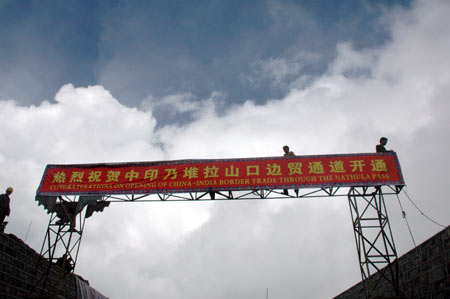|
India, China reopen Silk Road pass
(Reuters)
Updated: 2006-07-06 13:51
NATHU LA, China-India Border - Asian giants India and China opened a
Himalayan pass to border trade on Thursday, 44 years after a frontier war
shut down the ancient route.
Senior officials from China's
Tibet Autonomous Region and the tiny northeastern Indian state
of Sikkim cut a ribbon marking the border at the Nathu La pass as freezing rain
poured down.
Soldiers held up umbrellas instead of the automatic rifles
they usually carry. A thick mist obscured visibility.
|

Chinese workers
arrange the banner at the Nathu La Pass, July 4, 2006. China and India are
gearing up to restart border trade on Thursday through Tibet's Nathu La
Pass, a historic trading route that has been closed for 44 years.
[Xinhua]
| Scores of businessmen queued to
complete formalities before crossing into each other's territory through the
border post at Nathu La pass -- which means the pass of the listening ear -- to
visit newly built markets on either side.
"Today is a historic day,"
said Pawan Chamling, chief minister of India's Sikkim state.
"A contact
that started centuries back between our two civilisations is being
re-established today. The formal re-opening of this trade route will be a
win-win situation for both countries."
"The reopening of the Nathu La Pass
is a significant move to enhance Sino-Indian friendship and promote good
neighborly ties," said Qiangba Puncog, chairman of Tibet's regional government,
at a grand inaugural ceremony held at the border pass late Thursday morning.
"It's a major event for the two countries to expand and deepen trade and
economic cooperation and exchanges," he told an audience of about 400 officials
and businesspeople from both sides. "It marks Sino-Indian trade and economic
cooperation has entered a new phase."
Ties between India and China, the
world's two most populated nations, were marked by mutual suspicion for nearly
three decades after their border war in 1962 until a surge in trade and economic
ties pushed political disputes onto the backseat.
The pass is part of
the historic Silk Road -- a network of trails that connected ancient China with
India, Western Asia and Europe.
The reopening came days after Beijing
linked the Tibetan capital of Lhasa with a railway and is seen as another
move to help modernise the long-isolated region.
"This is a major
event for the China-India relationship," Sun Yuxi, Beijing's envoy to New Delhi,
told Reuters ahead of the inauguration.
"Nathu La border trade markets
will not only benefit border inhabitants in both countries and promote local
openness and development, but also further motivate and open up a new channel
for the blooming China-India trade relations," he said.
Although the two
countries have agreed to resolve their border rows politically, talks have made
slow progress and much of their 3,500-km (2,200-mile) frontier remains disputed.
CUT COSTS, ERASE HURT
Trade volumes, on the
other hand, have soared, to $18.7 billion in 2005, a growth of 37.5 percent over
the previous year. This year, trade is expected to reach $22-23 billion.
At an altitude of 4,310 metres (14,200 feet), Nathu La is the third
border trading point to be opened by India and China but is considered the most
significant as it controlled almost 80 percent of their entire trade before it
was closed in 1962.
Today, border exchanges account for a paltry $100
million of total trade with the rest being accounted for by sea and air.
Official border trade could touch $3 billion by 2015 through Nathu La
alone if the two countries build good roads, develop infrastructure in the
region and lift restrictions on goods that can be traded through the route, they
said.
"Before, bilateral trade had to be sea-borne and the costs were
high. In recent years, bilateral trade has developed rapidly, and now we can
shrink costs," said Zhang Guihong, an expert on China-South Asian ties at
Zhejiang University in eastern China.
Some analysts feel that closer
economic bonding would also eventually help the two countries leave the border
row behind.
"Initiatives like these will slowly change the perception of
our two peoples about the border dispute, which has remained the most vexed
problem," Sudheendra Kulkarni, a senior official in previous Indian Prime
Minister Atal Behari Vajpayee's office, wrote in the Sunday Express this week.
"In hostility-free relations between two neighbours, borders unite --
not divide -- markets and peoples," he said.
|
| |
|
| |
|
|
|
| Most Commented/Read Stories in 48 Hours |
|
|
|
|